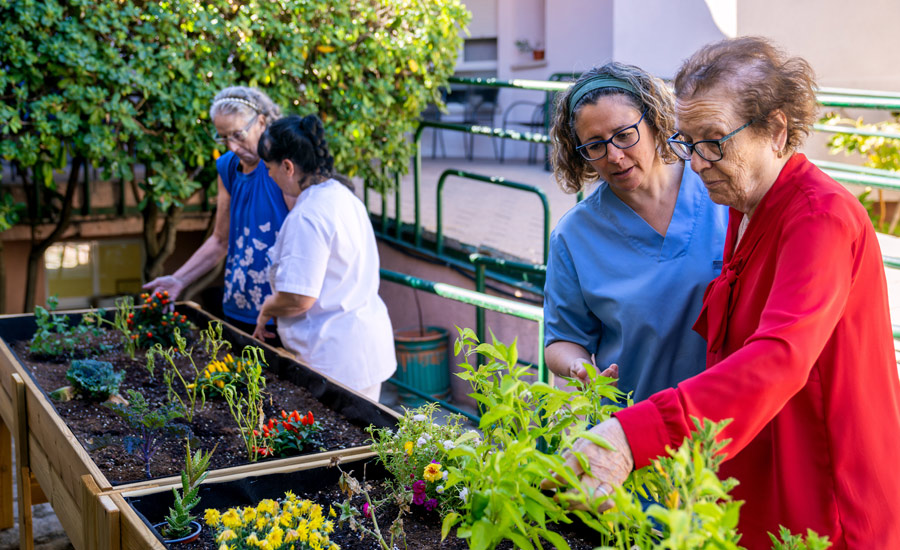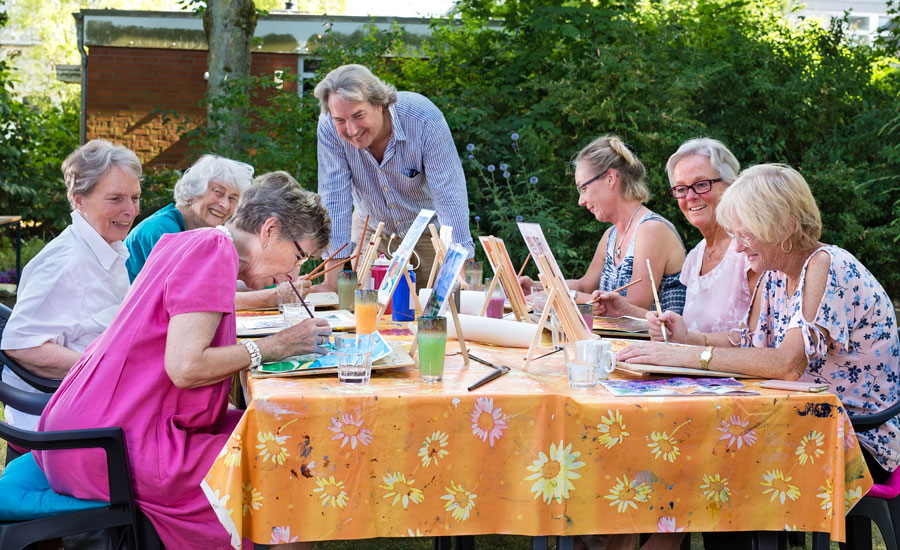How Care Home Activities Are Adapted for Different Stages of Dementia

More than 70% of care home residents in the UK have dementia or significant memory problems. That means care home teams are constantly adapting what they offer to suit different needs, attention spans and emotional states, all of which can shift as the condition progresses.
Keep reading as we look at how those care home activities are adapted to each stage of dementia and what makes them meaningful.
What Activities are Suitable for People with Dementia in Care Homes?
Activities such as music, light exercise, reminiscence, arts and crafts and sensory play are commonly used. These are adapted to each stage of dementia to support memory, reduce anxiety and provide comfort as needs and abilities change over time.
Activities for the Early Stage of Dementia
In the earlier stages of dementia, many residents can still follow conversation and remember routines. Keeping minds active and supporting independence helps your loved one stay connected to who they are.
Some activities at this stage include:
Music they know and enjoy
A playlist filled with music they love or a group sing-along can be surprisingly effective. Music often taps into long-term memory and can bring comfort when other things are harder to hold onto.
Simple cooking or baking
Helping to prepare food by stirring, decorating and measuring ingredients is a familiar, hands-on activity, encouraging focus and often leading to conversation, especially if it’s a recipe they love.
Board games or light puzzles
Straightforward games like dominoes or large-piece jigsaws can work well for the early stages of dementia, as long as they’re not too demanding. These can support attention and give a quiet sense of achievement.
Group conversations with prompts
Short, guided discussions based on photos, music or old objects draw out memories and the stories surrounding them. More importantly, this is also a chance to connect with fellow residents, which improves confidence.
Everyday tasks
Folding towels, watering plants or tidying books might seem simple, but they’re purposeful and reassuring, creating a much-needed feeling of familiarity. These kinds of tasks can help reduce anxiety by giving a sense of routine.
Activities for the Middle Stage of Dementia
As dementia progresses, memory loss deepens and following conversations or instructions may become more difficult.
Useful activities for this stage include:
Singing and familiar music
Listening to music or joining in with well-known songs can help ease agitation and support mood. Lyrics may be forgotten, but interestingly, tunes and rhythm often remain familiar long after names and places fade
Guided reminiscence
Short sessions built around personal photos, tactile objects or themed memory boxes (like childhood or past work life) provide recognition without putting pressure on memory.

Arts and crafts
Simple, repetitive tasks like painting, sponge printing or glueing pre-cut shapes work well at this stage. This activity for residents with dementia is less about the end result and more about the process, offering something to focus on that offers calm and a bit of pride.
Sensory activities
Textures, scents and colours become more meaningful as verbal communication declines. Tasks like sorting fabrics, handling bags with dried flowers or using water painting mats are soothing and low-pressure.
Short stories or poetry
Reading aloud in a slow, calm voice with familiar stories or rhymes is comforting and holds attention longer than conversation can alone.
Repetitive, familiar routines
Setting the table, folding napkins or organising items by colour or shape feels purposeful for residents with middle stages of dementia without being too complex. And they provide routine, reducing confusion in a busy care environment.
Activities for the Later Stage of Dementia
In the later stages of dementia, verbal communication may be limited, mobility might reduce and concentration is short. But that doesn’t mean activities stop. Even small, quiet moments offer connection.
Activities at this stage of dementia include:
Calming music
Soft, slow-paced music reduces distress, especially during personal care or quieter times of day – including sundown. Classical pieces, hymns or natural, familiar background sounds like birdsong or rainfall are often used.
Gentle touch and hand massage
A warm hand massage with lightly scented cream gives much needed comfort and a sense of calm. Physical contact, when done gently and respectfully, often communicates more than words at this stage of dementia.
Soft objects to hold
Comfort items like a familiar soft toy or textured cushion lessens anxiety and gives residents with dementia something simple to focus on. Some care homes use sensory cushions or twiddlemuffs to keep hands busy in a soothing way.
Scent-based activities
Familiar smells like lavender, mint, fresh herbs or baking scents can prompt recognition or simply offer comfort and are often used in short, one-to-one sessions.
Visual focus
Looking through books with large, clear images or watching slow-moving visuals, like nature programmes or fish tanks, will be calming when conversation isn’t possible.
One-to-one interaction
In the later stages, group sessions may be too much. Quiet, individual moments such as sitting together, sharing music and offering reassurance are often more meaningful and peaceful for the resident.
What Good Care Home Activity Planning Looks Like
Each stage of dementia brings different needs and no single activity will suit everyone but time spent on the right kind of interaction can reduce distress, ease isolation and ensure your loved one feels more settled.
Whether it’s music, exercise, gentle touch or quietly sitting together, what matters is that the demetnai care home activity respects the person and where they are in their condition.
Ready to explore...
